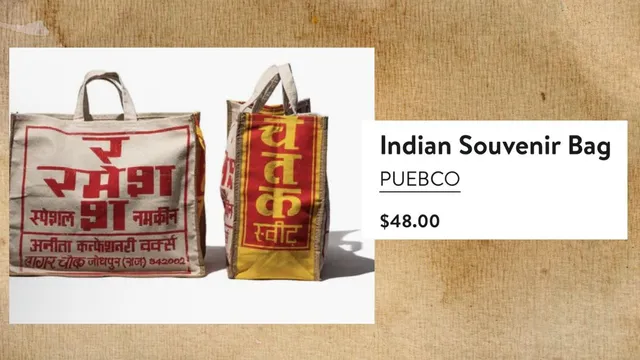- By Supratik Das
- Fri, 23 May 2025 03:22 PM (IST)
- Source:JND
In a strange twist of global trends, the plain old Indian jhola, that cloth bag long associated with grocery runs and daily needs has now found itself on the virtual shelves of high-end luxury retailer Nordstrom, rebranded as the “Indian Souvenir Bag” and priced at a staggering 48 USD (approximately Rs 4,100). Onw which is readily available for under Rs 100 or even given away with purchases at street markets, the jhola has been lauded for its environmentally friendly, reusable, and practical design in luxury brand store. But this simple cotton tote has now gained a face-lift courtesy of Japanese brand Puebco, which is selling the product as a one-of-a-kind, hand-stitched accessory on Nordstrom's website.
With bold Hindi lettering such as "Ramesh Special Namkeen" and "Chetak Sweets" the bag is presented as a cultural souvenir. Nordstrom calls it a "fashion bag, adorned with unique designs," suitable for "displaying admiration for a lovely country."The listing draws attention to the handmade aspect of the bag while warning consumers of possible "color fading and printing imperfections". Though the bag might be perceived as "an must-have for any traveller or admirer of Indian culture in US, Indians at home are trying to figure out the high cost for what is essentially a use-and-throw thaila.
Social Media In Splits: 'Is This A Joke?'
Social media sites went into frenzy once the listing hit viral. An Instagram user @nishapash joked, "Next it's gonna be some 'spiced and crisped snacks'. But we know it's just Haldirams." On X (previously Twitter), a user asked, "LMAO not Americans selling ₹80 Indian jholas for $48 like it’s some ancient artifact. "Another user wrote, "What in the name of scam is this!! Jhola being sold at a premium department store Nordstrom for $48!"
What in the name of scam is this!! Jhola being sold at a premium department store Nordstrom for $48! 😭😭
— Wordita (@wordi25) May 21, 2025
I’m a homesick person but even I haven’t reached these levels of nostalgia. pic.twitter.com/Zouw2rLpke
Whereas some see the global focus on the jhola as a celebration of Indian design and sustainability, others are decrying it as a blatant case of cultural repackaging and price inflation. Netizens have compared the decision to "typical coloniser behavior" for rebranding ordinary Indian products as specialist luxury brands for Western consumers.This is not a first. Indian household essentials have been hitting headlines outside of India before. Earlier, luxury fashion brands such as Balenciaga were in the limelight for retailing products that look like trash bags or packet chips for fancy prices. Now, with the jhola being included in the club, issues regarding commodification of culture and global fashion morality are once again in focus.
Also read: Is Jill Biden Really A Doctor? Who Is She? Trump Jr. Sparks Debate Amid Biden Cancer News

